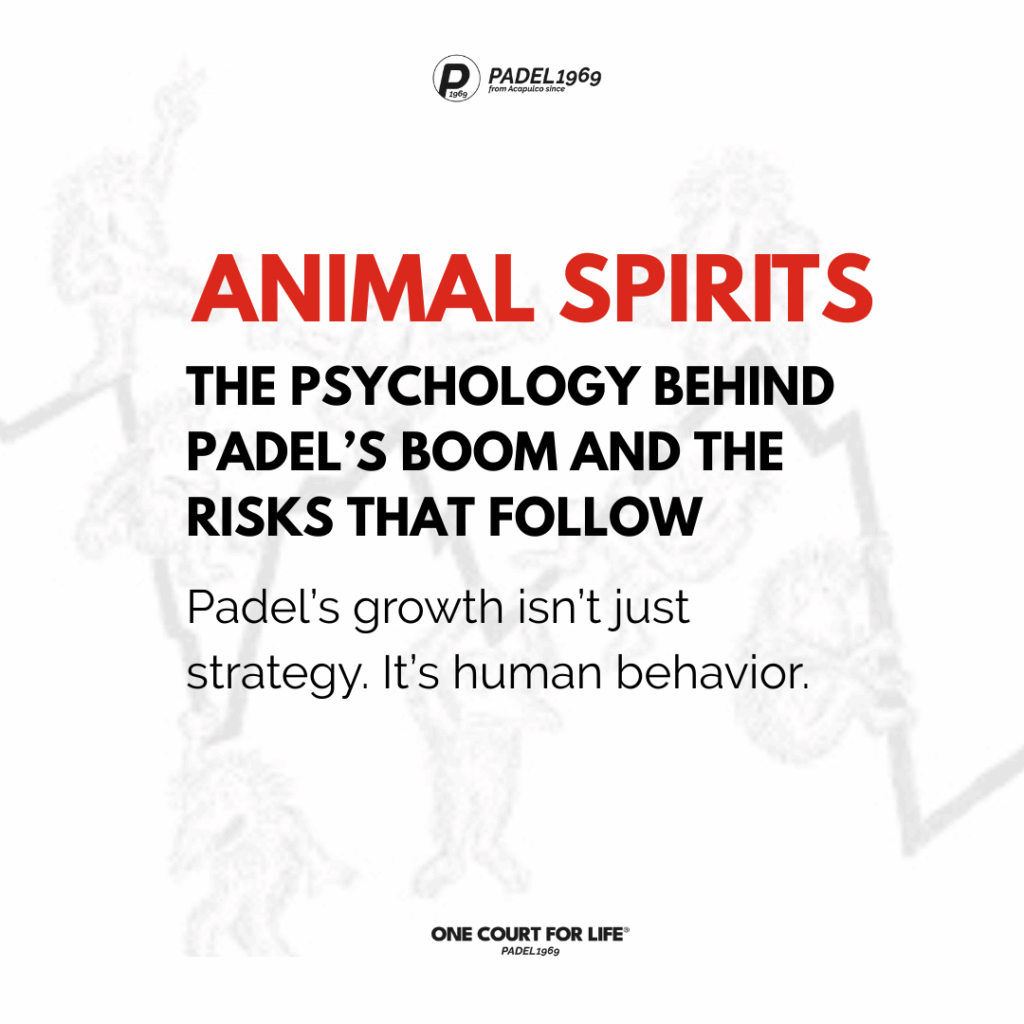Author: Atte Suominen | CEO & Founder PADEL1969
Economists George Akerlof and Robert Shiller introduced the concept of animal spirits to explain something many businesspeople and entrepreneurs already sense: markets and industries are not driven by data alone – they’re driven by human psychology.
Their work is particularly relevant for anyone involved in the padel industry. Whether you’re investing in a club, selling courts, launching a new venue, or promoting the sport in your community, understanding the psychological forces behind growth and decline can help you make better decisions and avoid costly mistakes.
Confidence: The Invisible Growth Engine
One of the most powerful animal spirits is confidence – what the authors call the “confidence multiplier.” When confidence is high, people invest, take risks, and assume tomorrow will be better than today. That’s what we saw in many markets during padel’s first wave of growth.
Entrepreneurs rushed in, players were excited, and early adopters saw full bookings, great press, and rapid returns. It felt like a gold rush – and in many ways, it was. Confidence spread quickly from one region to another, and so did padel courts.
This isn’t just market momentum. It’s psychology. When people believe, they act. And when they act, their belief is reinforced – until something breaks the cycle.
The Stories We Tell
Another force Akerlof and Shiller identify is the power of stories. In economic terms, narratives shape perception, which shapes behavior. In padel, we’ve all seen how quickly good stories travel:
- “It’s easier than tennis.”
- “Everyone from Ronaldo to local celebrities plays.”
- “It’s always booked – you have to try it!”
These stories inspire action. They drive bookings, attract investment, and shape how the public sees the sport. But stories are double-edged. When expectations aren’t met, the story flips. You start hearing:
- “It’s already saturated.”
- “No one plays during winter.”
- “It’s just a passing trend.”
In many countries for example Sweden and Finland, this shift has already started. It doesn’t mean the sport has failed – it means the narrative has changed. Due to multiple bankruptcies media has facts to show Padel operators failing which can be understood that Padel as a sport is failing. And if the only foundation was hype, collapse can follow. Learn more from Boom or Bust -article.
When Growth Turns to Collapse
This is the dark side of animal spirits. When confidence reverses, fear takes its place. Builders stop building. Players stop playing. Courts go unused, and investors pull out.
It often begins with overbuilding – when supply outpaces demand. This happened in several parts of Europe especially in Sweden, where clubs were launched based on assumptions, not long-term demand. We see same mistakes been done in Italy and in the UK. Without differentiation, strategic planning, or real customer engagement, these clubs became vulnerable the moment the story changed.
Padel has all the ingredients of a sustainable sport – but like any movement built too fast on emotional fuel, it can fall apart if not guided with discipline.
How to Steer Toward Sustainable Growth
The good news? Animal spirits don’t only lead to bubbles and busts. They can also be harnessed – steered with intention – to create sustainable success. Here’s how:
1. Build Confidence with Substance
Don’t sell hype. Sell experience. When you deliver consistent quality – excellent playing conditions, strong coaching, well-maintained facilities – people trust you. That trust creates long-term confidence, not just short-term excitement.
2. Shape Better Stories
Control the narrative around your brand and club – you padel community. Focus on health, community, and lifestyle benefits – stories that resonate over time, not just during a boom. If your story is based on celebrity appeal alone, it’s vulnerable to trend fatigue.
3. Invest Where the Market Is Real
Be honest about the numbers. Is there recurring demand? Is the local market truly underserved? Are you offering something differentiated? Let data and common sense temper your optimism. As Akerlof and Shiller suggest, animal spirits should inform, not replace, sound analysis.
4. Be Transparent and Fair
Trust is fragile. One bad actor – cutting corners on build quality, overcharging without value, promising returns that never come – can damage the entire market. Fairness, transparency, and integrity matter more than ever in emotionally driven markets.
5. Plan for the Plateau
Even in successful markets, growth slows. Build a model that thrives not just in peak times, but during slower seasons. Consider how to retain players, maintain engagement, and add value beyond the initial court opening.
The Takeaway
Padel’s rise has been emotional as much as logical. That’s not a bad thing – it’s what makes the sport exciting and alive. But if we want it to last, we need to understand the psychology behind its rise and prepare for the natural shifts that follow.
At PADEL1969, we help clubs and investors go beyond hype by building models that work when the dust settles. Because in the long run, health is wealth – and hype is never enough.
It is true that things are not always that straight forward. But it is true that human behavioural can be predicted relatively easily because of plenty of historical data is existing. Read more how to invest smart in Padel – The Intelligent Investor in Padel sector.
See you on the court.
– Atte Suominen
Ready to invest smarter in padel?
Talk to the PADEL1969 team — your experienced partner in the future of the sport.
Contact us if you want to build a Padel club and want to avoid most common mistakes, save your money and time. You can contact us at [email protected] for more on our advisory services. Partner with Experience.
PADEL1969 | from Acapulco since 1969.
Want to go deeper?
Animal Spirits: How Human Psychology Drives the Economy, and Why It Matters for Global Capitalism by George A. Akerlof and Robert J. Shiller explores how emotions like confidence, fear, and storytelling shape markets far more than we often admit. A must-read for anyone building in fast-moving industries like padel.

